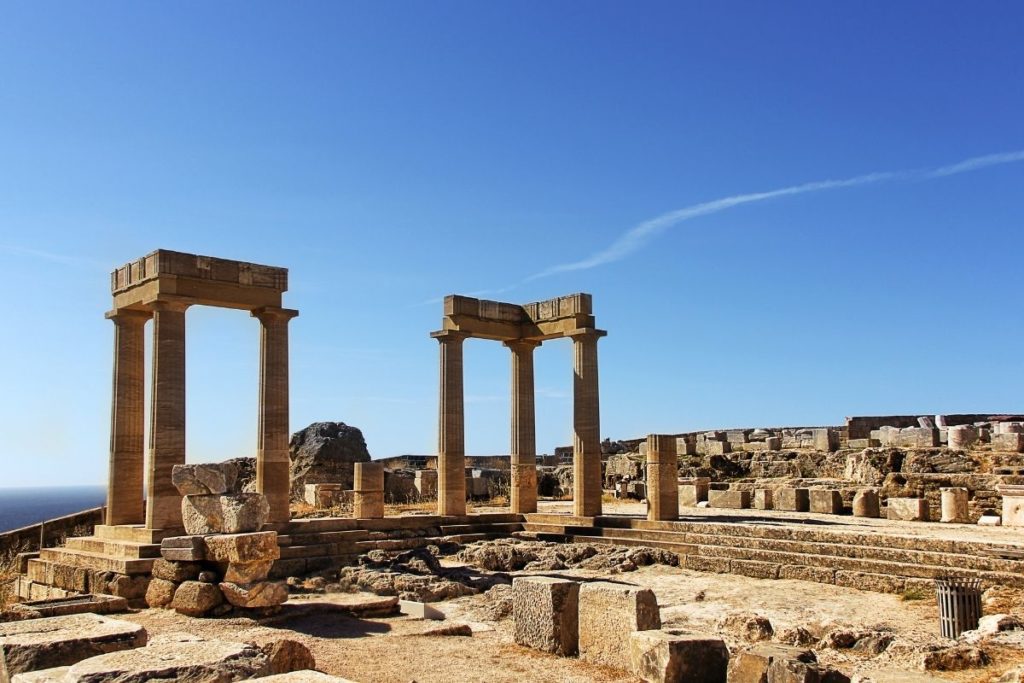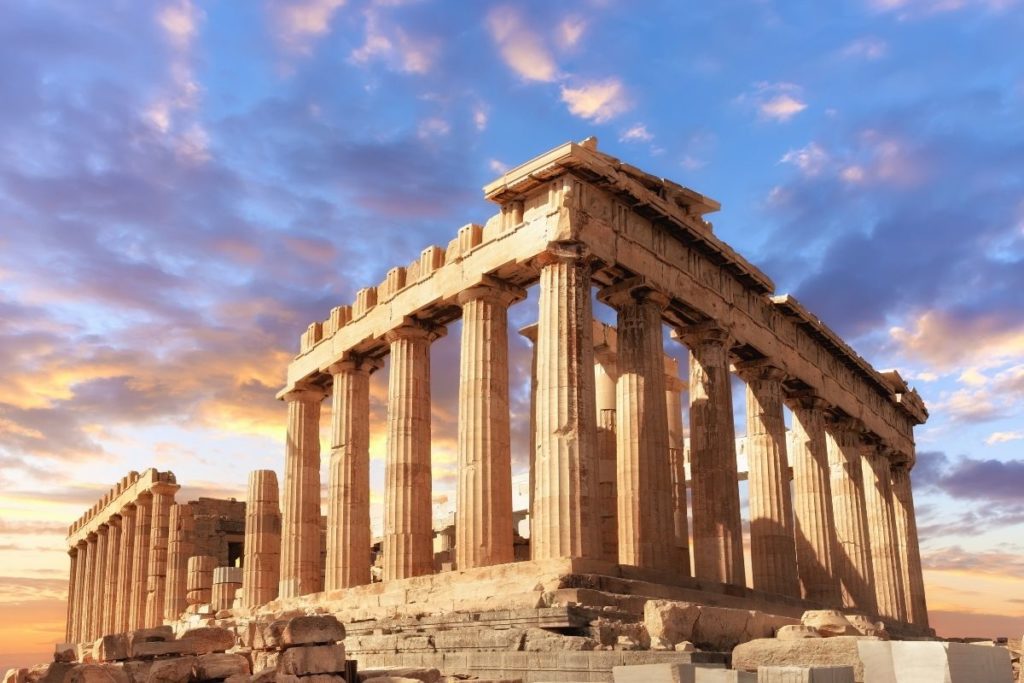Check out our guide which discusses the best time to visit Greece; find out the best temperatures, and what there is to do in Greece during the various seasons, as well as month by month. Read about the best activities and places to visit in Greece, no matter what time of year.
Turquoise seas and golden sands, blue skies and ancient ruins. Whatever time of year you visit Greece, you’re guaranteed to be greeted with beautiful scenery, diverse culture and mouth-watering cuisine.
Whether you vacation during the Summer months where the weather is hot and the beaches are bustling, the Mid-Season which is teeming with cultural experiences and picturesque villages, or the Winter where the country is calm and peaceful, make the most of your time in this magnificent holiday destination.
Summer Months: June to August

Best For Party-Goers, Friends And Families
During the summer months, tourism increases and temperatures reach fiery heights, sometimes exceeding
30ºC (86ºF). There’s lots to do, with guided sightseeing, ferries, watersports and clubs open and in full swing. The beaches are awash with friendly faces and you’ll experience an overall summer vacation atmosphere.
Pros
- Scorching temperatures and sunny skies
- Lots of activities and sightseeing for both kids and adults
- Lively, vibrant atmosphere for people on vacation
Cons
- Beaches and towns are very busy with crowds in full force
- Expensive prices for flights and accommodation
- May be too hot for some vacationers
Mid Season: April & May, September & October
Best For Cultural Experiences
The mid season months see a marked reduction in crowds and prices, which means that you can pack more into your time in Greece. It’s easier to get around and see everything you want to see, with beaches, villages, bars, activities and sightseeing areas less heavily populated than during the Summer months.
Most things are still open, and you can enjoy restaurants, live music and local stores without the hassle of those pesky crowds.
Pros
- Experience Greece’s culture more fully due to reduced crowds
- Less populated beaches and sights
- Still hot enough to enjoy the Mediterranean weather
Cons
- Some services may be reduced, such as ferry crossings
- Difficult for some vacationers to travel at this time of year
Winter Months: November to March
Best For A Calm And Inexpensive Break
Visiting Greece during the Winter months comes with a host of advantages, such as heavily reduced flight and accommodation prices, a calm and tranquil atmosphere and a decrease in tourists.
Winter is a great time to visit Greece if you’re looking for a break somewhere filled with culture and beauty, but it’s not the best time travel if you want that summer vacation vibe and hot temperatures.
Pros
- Cheaper flights and accommodation
- Good for a quiet break away due to the lack of tourists, especially for couples visiting Greece
Cons
- Much colder temperatures
- Most tourist services such as ferry crossings shut down
- Bars, clubs, stores and activities shut down or reduced
Key Events In Greece By Month
January
Greece’s tourist scene pretty much closes down completely during Winter. Yet, the islands are still highly welcoming of visitors and it’s a great time to experience real Grecian culture.
Festivals aimed at locals take place; such as The day of Christ’s baptism by St John on January 6th, where all seas, rivers and lakes are blessed and a huge ceremony takes place at Piraeus.
February
February may seem like a strange month to visit Greece, but if you can grab a cheap flight it’s definitely worth experiencing Patra’s Carnival and Skyros. These crazy festivals are brilliant for party lovers, and feature big parades and feasts, traditional Greek dancing and lots of fancy dress.
March
March is still a pretty quiet and tourist-free month for Greece, but temperatures begin to creep up and lots of religious festivals take place in towns and villages. On the 25th March, Greece celebrates Independence Day, which features numerous festivities, parades and dancing.
April
April is a wonderful month to visit Greece, as orange blossom tinges the air, the sun shines and the weather is warm. Crowds are still relatively minimal and holiday packages less expensive. Lots of native Greeks vacation across the islands during the Easter weekend, and some businesses close down. Orthodox Easter is celebrated vibrantly.
May
Greece becomes a sanctuary of natural beauty during May. For hikers, May is the best time to visit Greece’s gorgeous trails. Temperatures are still warm yet mild enough for a long day’s hiking, and the abundance of wildflowers paint the islands with an array of vibrant colors.
Local culture and cuisine it at it’s best in May, and May Day implements mass picnics by the locals. Wildflowers, associated with workers’ rights in Greece, are used to make beautiful home decorations.
June
June is when temperatures start to heat up in Greece, and where tourists begin to flock to the mainland where a host of both international and national music artists hold concerts and festivals. The Feast of St John the Baptist takes place on 24th June, when the Greeks hold parties and atmospheric bonfires to celebrate.
July
Blistering sunshine envelopes Greece in July. Temperatures rise and the buzzing nightlife opens up as tourists gather in masses on golden beaches.
Tourism is at it’s peak and lots of activities and events take place. Rockwave Festival near Athens takes place in July, which hosts huge international music artists and brings a wide variety of people and cultures to Greece for the month.
August
August is when the sun is really blazing in Greece. Temperatures are at their highest, so prepare to sweat a little. Sands are scorching and seas glisten, and at night the moon is at its brightest.
That’s why many historic venues in Athens open up their doors for moonlit shows and performances, and lots of the towns and cities celebrate the August moon festival with music, dance, and a vast array of cultural talents.
September
The sun in September is still shining, yet the temperature has dropped a little to a more pleasant and manageable heat.
Greece is still open for business and focused on entertaining tourists, yet the crowds have slimmed down. Gennisis Tis Panagias takes place on 8th September, marked by country-wide feasts and religious celebrations.
October
The majority of the islands begin to empty of tourists in October, but the warm, sunny weather remains and most services remain open. Ohi Day is celebrated on the 28th, which commemorates Prime Minister Metaxas’ response to Mussolin’s demand for his troops to have free passage through Greece in 1940.
November
Temperatures drop in November, yet olive-picking and feta cheese production is in full force; so it’s a great time to visit for a foodie. Especially if you prefer a calmer atmosphere for sightseeing and relaxing. Also, the Thessaloniki International Film Festival takes place in November, where 150 movies are shown to the public across 11 screening days.
December
The islands might be calm and still, but the cities of Athens and Thessaloniki are partying on. Colder temperatures and chilled waters turn away many tourists, which means you are more likely to have a highly cultural experience, by meeting locals and spending more time sightseeing.
Visiting at Christmas time will ensure that you can partake in the numerous vibrant festivities and glorious feasts.
Best Things To Do In Greece

Acropolis
Acropolis is a historic citadel situated on a rocky outcrop above Athens, containing the remains of historically significant ancient architecture, specifically the world-famous Parthenon.
Imbros Gorge
Imbros Gorge is the historical route through which Allied Forces escaped Crete in 1941 after losing the Battle of Crete.
Hiking Trail Fira Oia
Fira Oia is a beautiful 6.5 mile hiking trail located in Santorini, that is filled with vivid wild flowers and eye-catching scenery.
Tsambika Beach
Tsambika Beach is one of the most picturesque beaches on Rhodes, boasting soft, golden sands for miles and a collection of tarvernas and bars along the way.
Paleokastritsa Monastery
A small and historically prevalent monastery situated north west of Corfu island.
Church of Saint Dimitrios
The church of Saint Great-martyr Demetrios the Myrrh-gusher, who was the patron of Thessaloniki, has been around since 5th century AD, and was constructed by Leontius, the prefect of Illyricum.
Porto Limnionas Beach
Porto Limnionas Beach is one of the most secluded, naturally wild, and beautiful places in Greece. It’s well worth a visit, if you can find it!
Heraklion Archaeological Museum
The Heraklion Archaeological Museum is one of the most historically significant museums in the whole of Greece, and one of the most important museums in Europe. It showcases valuable artefacts from all parts of Cretan history and is a must-see for history buffs.
Monolithos Castle
Monolithos Castle was one of the four major castles present in Rhodes. It was built way back in the 14th century by knights so that they could exact control of the sea and protect the locals from pirates.
Agrari Beach
Agrari Beach is one of the most beautiful and tranquil beaches in Greece. Located in Mykonos, it hosts a scenic bay between Super Paradise and Elia Beach, just on the outskirts of the island’s capital city.
Palace of the Grand Master of the Knights of Rhodes
The Palace of the Grand Master of the Knights of Rhodes, sometimes referred to as the Kastello is a magnificent medieval castle based in Rhodes. It’s a highly valued building and displays an example of outstanding Gothic architecture.
Plaka Forest
Plaka Forest, located on Kos, is heavily populated with peacocks and cats, and therefore demonstrates a fantastic place to visit for animal enthusiasts. It’s filled with natural beauty and peaceful woodland.
Factors To Consider When Choosing When To Visit Greece
Deciding when to visit Greece is dependent on your own individual preferences and what you would like to get from your vacation. If you enjoy blazing hot weather, sunbathing, lively crowds, and lots of activities – you would be better off visiting in the Summer months.
If you’re looking for a calm, quiet, and inexpensive way to experience a different culture, and aren’t bothered about the temperature, Winter would be an ideal time to visit. If you’re looking for something in the middle, you should consider mid-season as an optimal time to vacation in Greece.
Whenever you decide to travel to Greece, you will have an excellent time, as it’s hard to beat Greece’s other-wordly cuisine, vibrant culture, and amazing sights!
Best Time To Visit Greece – Conclusion
The best time to visit Greece is outside the busy summer peaks, during spring (April to June) and early fall (September and October). Temperatures are warm but not stifling, and you’ll find that destinations are open but still relatively quiet.
The period from November to February tends to be colder, but city attractions remain open and are pleasantly quiet. Summer brings steamy, hot weather and hordes of visitors at the main sights and on the islands.
There are lots of fun activities to do and many gorgeous places to visit in Greece, so no matter what time of year you choose to visit, you’ll have a fantastic time.
